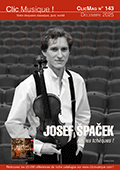 Gerald Barry (1952-), disciple irlandais de Maurizio Kagel et de Karlheinz Stockhausen, cultive une forme d’imprédictibilité, d’étrangeté sonore, de laquelle naît une musique qui semble évoluer à cloche-pied et dont on est surpris qu’elle arrive finalement à bon port ("1988", pour violon et piano et, peut-être encore plus, "Triorchic Blues", pour trio avec piano, écrit en référence au castrat Tenducci, affublé, d’après Casanova, de trois testicules), plus décalée que délicate ("All day at home busy with my own affairs", pour piano), parfois entêtée (le thème, minimal et obstiné, de "Midday", pour violon et piano), peut-être irrévérencieuse (les trois courts mouvements de Baroness von Ritkart, pour violon et piano, aux titres asymétriques), aux respirations déconcertantes ("Ø", pour quatuor avec piano, à la mélancolie tendue et pour lequel le Fidelio Trio s’adjoint un alto) et aux revendications hachées ("In the Asylum" pour trio avec piano, qui donne son nom à l’album). Une sélection de la musique de chambre enjouée de Barry (un des compositeurs de son pays les plus connus à l’étranger), moins diffusée que ses opéras et qui tient en haleine – même si j’ai moins accroché au potache "Le Vieux Sourd" (surnom donné par Debussy à Beethoven). (Bernard Vincken)  Born in Ireland in 1952, Gerald Barry is a composer of singular imagination. He is perhaps best known for his operas, and his music is at once playful yet unyielding, baffling yet enlightening. This fine recording from the Fidelio Trio showcases some of Barry’s lesser-known chamber music and is a rare and strange delight. The works featured cover some 36 years of composition, including Ø for piano quartet from 1979. The piece was originally scored for two pianos playing the same score simultaneously: ‘an impossibly vulnerable task’, notes the composer. This version for piano quartet features the ensemble playing the same simple, questing melody in unison throughout – and this delicate performance (the trio here joined by Rose Redgrave on viola) draws a compelling sense of tension and a curious melancholy from the task. Barry’s idiosyncratic wit is neatly conveyed in his Baroness von Ritkart for violin and piano (performed with deadpan restraint here), where its three brief movements (each lasts less than a minute) are titled: ‘1 – Clever, noble, but not talented; 2 – Talented, noble, but not clever; 3 – Talented, clever, but not noble’. Other highlights include the tightly-woven In the Asylum for piano trio and Midday for violin and piano, which explores with serene insistence a series of tapping motifs (and also exists, according to the composer, in ‘a loud version for eight horns and two wind machines’). Beautifully performed throughout and featuring Barry’s own extraordinarily enjoyable sleeve notes, this is a terrific album which offers welcome insight into a composer of daring and integrity.
 |
